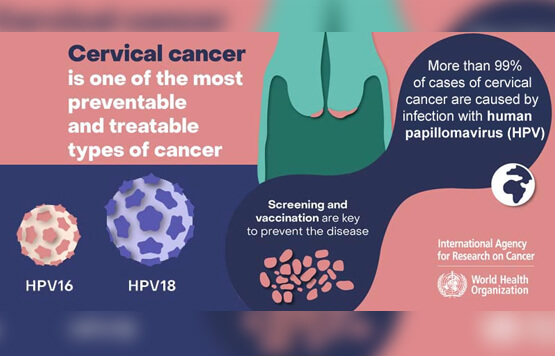Cervical Cancer is a type of cancer that starts in the cervix, which is the lower part of the uterus that connects to the vagina. It usually develops slowly over time, beginning with abnormal changes in the cells of the cervix. The primary cause of cervical cancer is the Human Papillomavirus (HPV), which is a common sexually transmitted infection. Not all types of HPV cause cervical cancer, but some can lead to abnormal changes in the cells of the cervix, increasing the risk of cancer development.
The increased risk of cervical cancer includes smoking, Weak Immune System, and Multiple Sexual Partners. Cervical cancer may not present with symptoms at first but it may produce signs and symptoms, including Vaginal bleeding occurs after intercourse, between menstruation, or during menopause, Menstrual bleeding that is heavier and lasts longer than expected, Watery, red vaginal discharge that may be thick, and Pelvic discomfort or soreness.
The most essential things you can do to help prevent cervical cancer are to get vaccinated against HPV, have frequent screening tests, and see your doctor if your screening test results are abnormal. Human Papillomavirus (HPV) vaccine vaccination protects against the HPV strains that most often cause cervical, vaginal, and vulvar malignancies. HPV vaccine is advised for teenagers aged 11 to 12, however it can be given as early as age nine. The HPV vaccination is also advised for everyone up to the age of 26, if they have not already been immunised. If immunisation begins before the age of 15, a two-dose regimen is advised, with the doses administered 6 to 12 months apart. For those who begin the series after their 15th birthday, the vaccination is administered in three doses.

HPV vaccine protects against future HPV infections but does not treat existing infections or illnesses. This is why the HPV vaccination is most effective when administered prior to HPV infection. Even if you've had the HPV vaccine, you should get checked for cervical cancer on a regular basis.
Two screening tests can help detect changes that could develop precancerous or cervical cancer— The Pap test (also known as a Pap smear) detects precancerous cell abnormalities on the cervix that, if not treated properly, can progress to cervical cancer. The HPV test detects the virus (human papillomavirus) that causes these cell alterations.
Apart from these, awareness is equally important for girls and women. Awareness sessions at various schools, communities and hospitals had to be conducted thus women be aware of these serious health issues and can take necessary steps.
Cervical cancer is a dangerous, yet avoidable, illness. Understanding the risk factors, symptoms, and preventative techniques allows you to take charge of your health and lower your chance of developing cervical cancer. Remember to speak with your healthcare professional if you have any concerns or questions regarding cervical cancer screening and prevention.
Child Help Foundation along with Filaantro has always monitored women's health emergencies and helped them receive care. Financial help is provided to children, particularly girls, who have life-threatening diseases. Many children have benefitted from exceptional treatments thanks to the donor, and in addition to these awareness efforts, frequent medical check-ups in distant areas assist ensure that these children receive the necessary care at the appropriate time.
